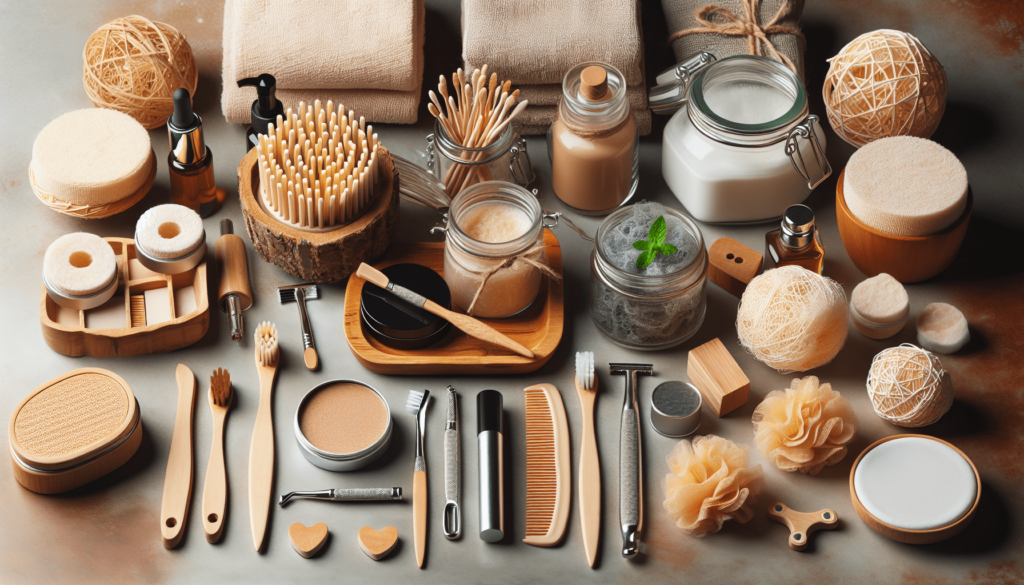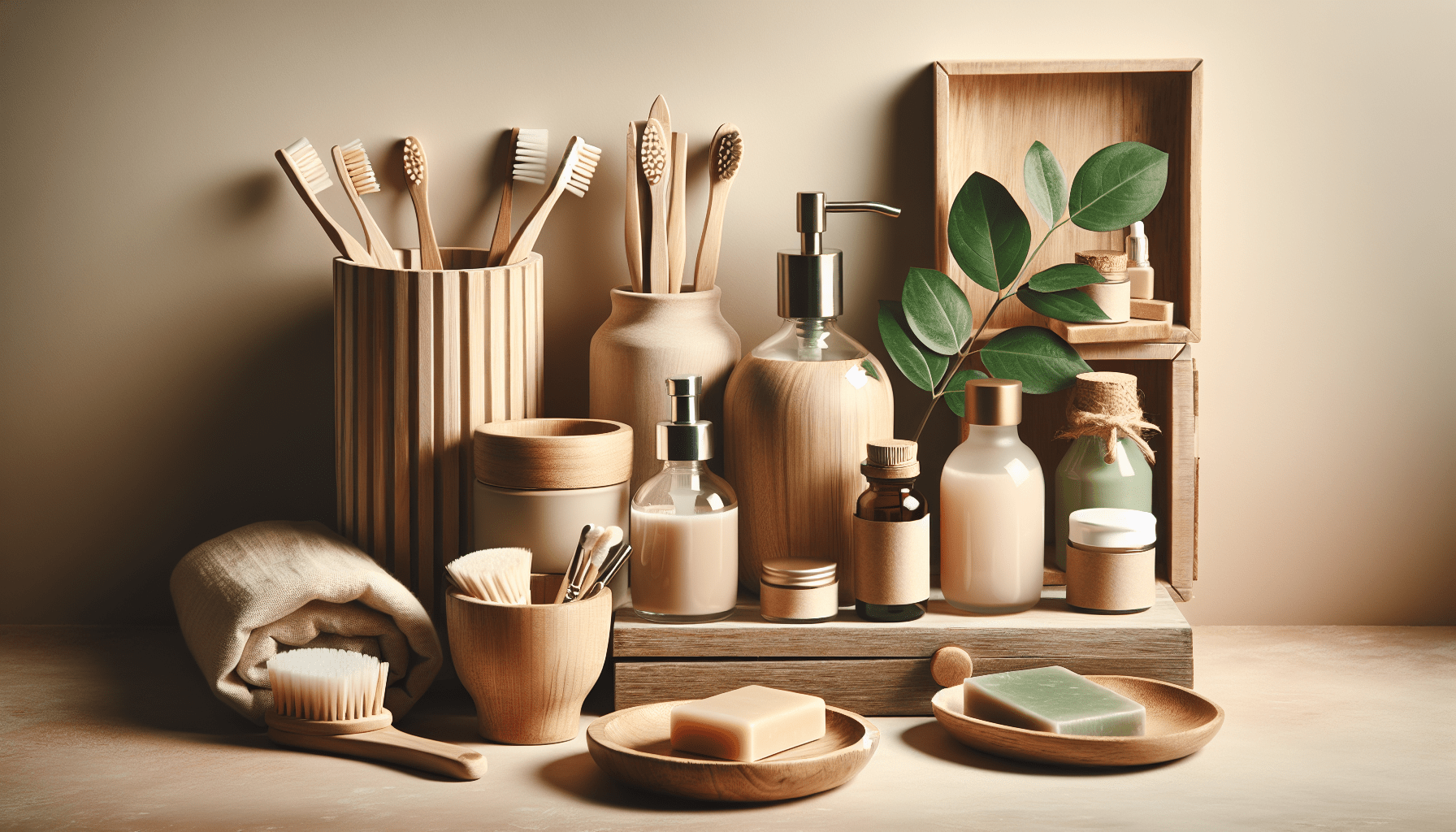Imagine having a beauty routine that not only makes you look and feel fabulous but also helps the environment. With the growing concern for sustainability, a zero-waste beauty routine has become a popular trend. This article will provide you with valuable tips and product recommendations on how to achieve a beauty routine that leaves no waste behind. By incorporating simple yet effective practices into your daily routine, you can minimize your environmental impact without sacrificing your beauty regimen. Learn how to make a positive change while looking your best.
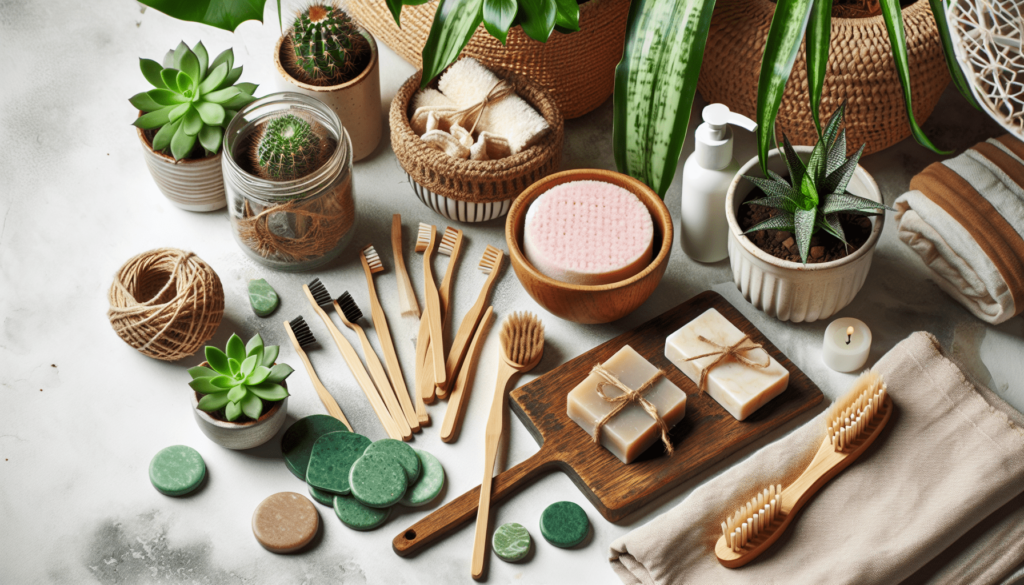
Switch to reusable products
Cotton rounds
Switching to reusable cotton rounds is a great way to reduce waste in your beauty routine. Instead of using disposable cotton rounds that end up in the trash after a single use, opt for reusable ones that can be washed and used again. These reusable cotton rounds are often made from soft and sustainable materials such as bamboo or organic cotton. Not only will you be reducing waste, but you’ll also be saving money in the long run by not having to constantly repurchase disposable cotton rounds.
Makeup remover pads
Similar to cotton rounds, makeup remover pads are another single-use product that can easily be replaced with reusable alternatives. Instead of using disposable pads that are thrown away after a single use, you can switch to reusable makeup remover pads that can be washed and used again. These pads are typically made from soft and durable materials like bamboo or organic cotton, making them gentle on your skin while being eco-friendly.
Menstrual products
Another area where you can make a significant impact on waste reduction is by switching to reusable menstrual products. Disposable tampons and pads contribute to a tremendous amount of waste, but there are alternative options available. Menstrual cups, reusable cloth pads, and period underwear are all great alternatives that can be used multiple times, eliminating the need for single-use products. By making this switch, not only will you be reducing waste, but you’ll also be saving money and potentially experiencing more comfort during your period.
DIY skincare and beauty products
Homemade face masks
Making your own face masks at home is not only a fun and creative activity, but it’s also a great way to reduce waste. Many store-bought face masks come in single-use plastic packaging, but by making your own, you can eliminate the need for excessive packaging. There are numerous recipes available online using simple ingredients like honey, yogurt, or avocado. Homemade face masks allow you to customize the ingredients based on your specific skincare needs, and you can store any leftovers in reusable glass containers.
Natural hair treatments
Instead of relying solely on commercial hair treatments that often come in plastic packaging, consider trying natural alternatives. Coconut oil, olive oil, and avocado are just a few examples of natural ingredients that can be used to nourish and condition your hair. These ingredients can be purchased in bulk or in glass containers, reducing the amount of plastic waste generated. By incorporating natural hair treatments into your routine, you not only reduce waste but also provide your hair with the benefits of natural and chemical-free ingredients.
DIY lip balm
Lip balm is a staple in many people’s beauty routines, but it often comes in plastic tubes or containers that end up in the trash after use. Making your own lip balm at home is a simple and cost-effective way to switch to a zero-waste option. By using ingredients like beeswax, shea butter, and coconut oil, you can create a nourishing lip balm that can be stored in reusable containers such as metal tins or glass jars. Not only will you be eliminating plastic waste, but you’ll also have the satisfaction of customizing the scent and flavor of your lip balm.
Choose package-free or refillable options
Bar soaps
Bar soaps are a popular choice for eco-conscious individuals because they often come in minimal or no packaging at all. By opting for a bar soap instead of liquid soap in plastic bottles, you can significantly reduce your waste. There are various options available, including natural and organic bar soaps that are gentle on your skin and the environment. Look for products that are free from harsh chemicals and come from sustainable sources.
Shampoo bars
Similar to bar soaps, shampoo bars offer a waste-free alternative to traditional liquid shampoos. These solid bars can be lathered up and used just like any other shampoo but without the need for plastic bottles that end up in the landfill. Shampoo bars come in a variety of formulations to suit different hair types and concerns. Some even come in compostable packaging or are available in bulk, allowing you to refill your own container. By switching to shampoo bars, you can significantly reduce your plastic waste while still keeping your hair clean and healthy.
Refillable foundation
Instead of constantly purchasing new foundation bottles that come in plastic packaging, consider switching to refillable options. Some companies offer foundation products where you can purchase a refill pack to use with a reusable container. These refillable foundations not only reduce waste but often come in more sustainable packaging like glass or metal. By making this switch, you can still enjoy the benefits of foundation while minimizing your environmental impact.
Lipstick refills
Another way to reduce waste in your beauty routine is by opting for lipstick refills. Instead of buying new lipstick tubes every time you run out, some brands offer refillable options where you just need to purchase the lipstick refill. These refills typically come in minimal packaging or none at all, reducing the amount of waste generated. By choosing refillable lipsticks, you can still enjoy a variety of colors and finishes without contributing to excessive waste.
Consider solid or concentrated products
Solid moisturizers
Solid moisturizers are a great option for those looking to reduce waste in their beauty routine. These moisturizers usually come in the form of solid bars or balms that can be applied directly to the skin. By opting for solid moisturizers, you eliminate the need for plastic bottles or tubes that are often associated with traditional lotions. Additionally, solid moisturizers tend to have more concentrated formulas, meaning a little goes a long way. This results in less product waste and a longer-lasting moisturizer.
Concentrated serums
Similar to solid moisturizers, concentrated serums offer a waste-reducing alternative to traditional liquid serums. These serums are highly concentrated, meaning you only need a small amount to reap the benefits. By using concentrated serums, you not only reduce the amount of packaging waste but also extend the life of the product. Many brands offer concentrated serums in glass or metal packaging, further reducing the environmental impact.
Solid perfumes
Solid perfumes are a sustainable alternative to traditional liquid perfumes. These perfumes usually come in small, portable tins or containers, making them ideal for on-the-go touch-ups. Since they are solid, there is no need for excessive packaging or plastic bottles. Solid perfumes come in a variety of scents and formulations, allowing you to find your preferred fragrance without contributing to waste. By choosing solid perfumes, you not only reduce waste but also support brands that prioritize sustainability.
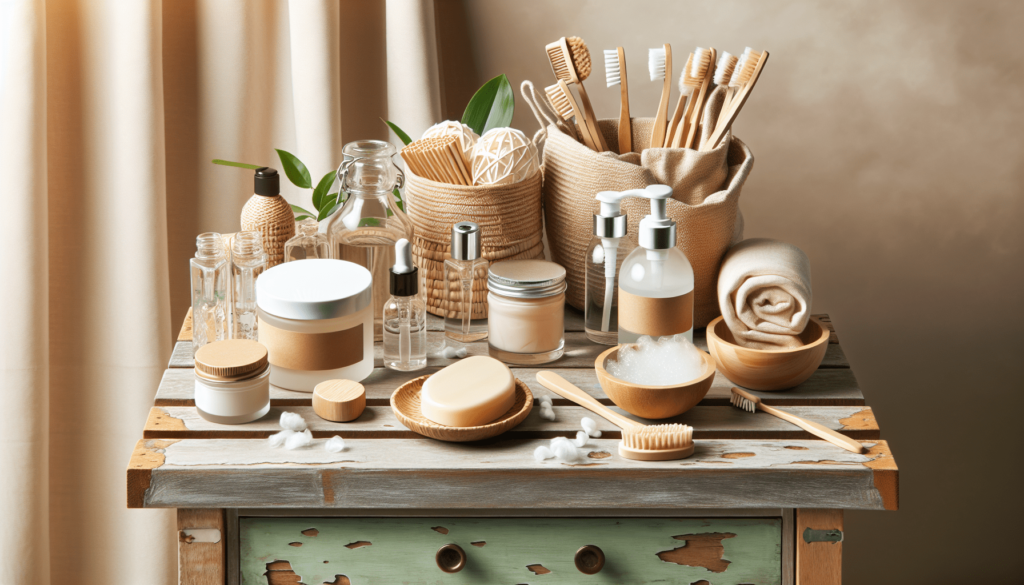
Opt for sustainable packaging
Glass containers
Choosing products that come in glass containers is a sustainable option in terms of packaging. Glass is a highly recyclable material and can be reused or repurposed even after the product is finished. Many brands offer skincare and beauty products in glass containers, including moisturizers, serums, and face oils. By opting for glass packaging, you not only reduce your plastic waste but also contribute to a circular economy where materials are reused and recycled.
Bamboo packaging
Bamboo is a fast-growing and renewable resource that has gained popularity as a sustainable packaging option. Many brands are now incorporating bamboo packaging into their product lines, including toothbrushes, makeup brushes, and even skincare products. Bamboo packaging is not only biodegradable but also lightweight and durable. By choosing products with bamboo packaging, you can minimize your environmental impact and support brands that prioritize sustainability.
Biodegradable tubes
One of the most common types of packaging in the beauty industry is plastic tubes. However, many brands are now offering biodegradable tubes as an eco-friendly alternative. These tubes are typically made from plant-based materials, such as sugarcane or cornstarch, which are biodegradable and compostable. By opting for products with biodegradable tubes, you can significantly reduce your plastic waste and support brands that are committed to sustainability.
Minimize single-use plastic
Bamboo toothbrush
One simple switch you can make in your daily routine is switching to a bamboo toothbrush. Traditional plastic toothbrushes contribute to the large amounts of plastic waste that end up in landfills and oceans. Bamboo toothbrushes, on the other hand, have biodegradable handles and bristles made from sustainable materials. By using a bamboo toothbrush, you can significantly reduce your plastic waste without compromising on oral hygiene.
Metal safety razor
Another way to minimize single-use plastic in your beauty routine is by switching to a metal safety razor for shaving. Disposable plastic razors are a significant source of plastic waste, as they are often discarded after just a few uses. Metal safety razors, on the other hand, have reusable and replaceable blades, eliminating the need for disposable razors. These razors are built to last and can be a long-term investment that saves you money and reduces your plastic waste.
Reusable makeup brushes
Makeup brushes are another commonly used beauty tool that often come with single-use plastic packaging. By opting for reusable makeup brushes made from sustainable materials like bamboo or recycled plastic, you can significantly reduce your waste. These brushes are durable and can be washed and used again and again, prolonging their lifespan and reducing the need to constantly repurchase new brushes. By choosing reusable makeup brushes, you can enjoy the benefits of quality tools while minimizing your environmental impact.
Stainless steel razor blades
If you prefer using a safety razor or straight razor for shaving, consider switching to stainless steel blades. These blades are highly durable and can be used multiple times before needing to be replaced. Compared to disposable plastic blades, stainless steel blades produce far less waste and are more environmentally friendly. By choosing stainless steel razor blades, you can reduce your plastic waste and invest in a long-lasting shaving solution.
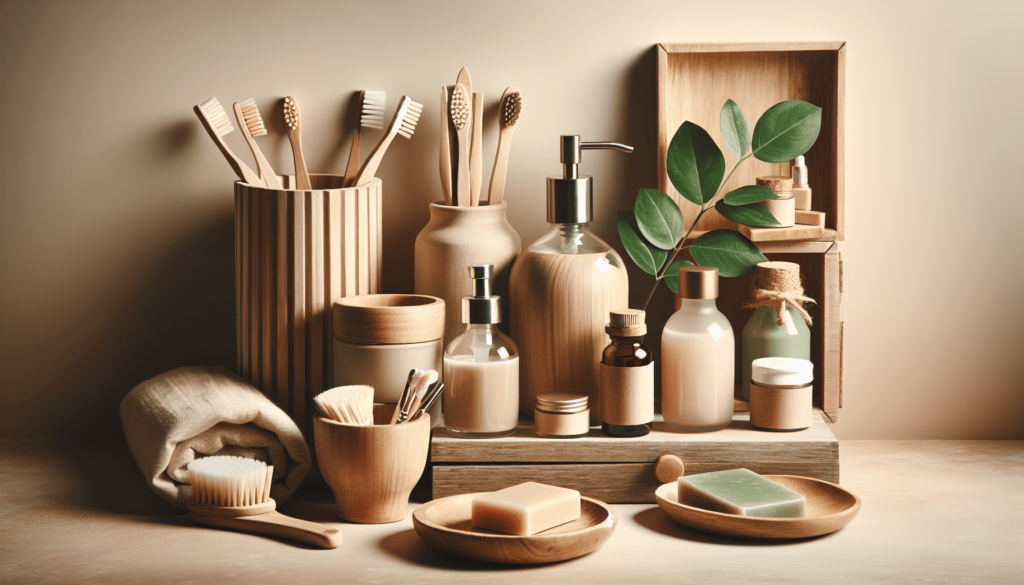
Choose eco-friendly cleansers
Natural face wash
Choosing a natural face wash is not only beneficial for your skin but also for the environment. Many commercial face washes contain harsh chemicals and come in plastic bottles that contribute to waste. Opt for natural and organic face washes that are free from harmful ingredients and packaged in eco-friendly materials. Look for products that use plant-based ingredients and biodegradable packaging to minimize your environmental impact.
Plant-based body wash
Similar to face wash, plant-based body washes offer a sustainable alternative to conventional products. These body washes are typically made from natural and organic ingredients, omitting harsh chemicals that can be harmful to both your skin and the environment. Look for body washes that come in recyclable or biodegradable packaging to further reduce your waste. By choosing plant-based body washes, you can nourish your skin while minimizing your impact on the planet.
Solid shampoo
Solid shampoo bars, as mentioned earlier, are a fantastic option for reducing waste in your beauty routine. They not only eliminate the need for plastic bottles but also offer a concentrated formula that lasts longer than traditional liquid shampoos. Solid shampoos often contain natural and nourishing ingredients that are gentle on your hair and scalp. By switching to solid shampoo bars, you can simplify your shower routine while minimizing plastic waste.
Support zero-waste brands
Package-free stores
Supporting package-free stores is a great way to align your shopping habits with sustainable practices. These stores offer a wide range of products, from personal care items to household essentials, all without the unnecessary packaging. By bringing your own containers or bags, you can shop for the products you need and reduce your waste at the same time. Package-free stores are becoming more popular, so be sure to look for one in your area or consider shopping online from zero-waste retailers.
Ethical and sustainable brands
Choosing to support ethical and sustainable brands is another way to contribute to a zero-waste beauty routine. These brands prioritize environmentally friendly practices throughout their supply chain, from sourcing ingredients to packaging materials. Look for certifications and labels that indicate a brand’s commitment to sustainability, such as organic, fair trade, or cruelty-free certifications. By supporting these brands, you can ensure that your beauty products are produced ethically and with minimal impact on the planet.
Cruelty-free and vegan options
In addition to supporting ethical and sustainable brands, opting for cruelty-free and vegan beauty products is another way to align your beauty routine with your values. Cruelty-free products are not tested on animals, and vegan products are free from animal-derived ingredients. By choosing these products, you can support brands that prioritize animal welfare and eliminate the demand for products that harm animals or exploit them for their ingredients. Look for logos and certifications that verify a brand’s cruelty-free and vegan status to ensure that your beauty products are aligned with your values.
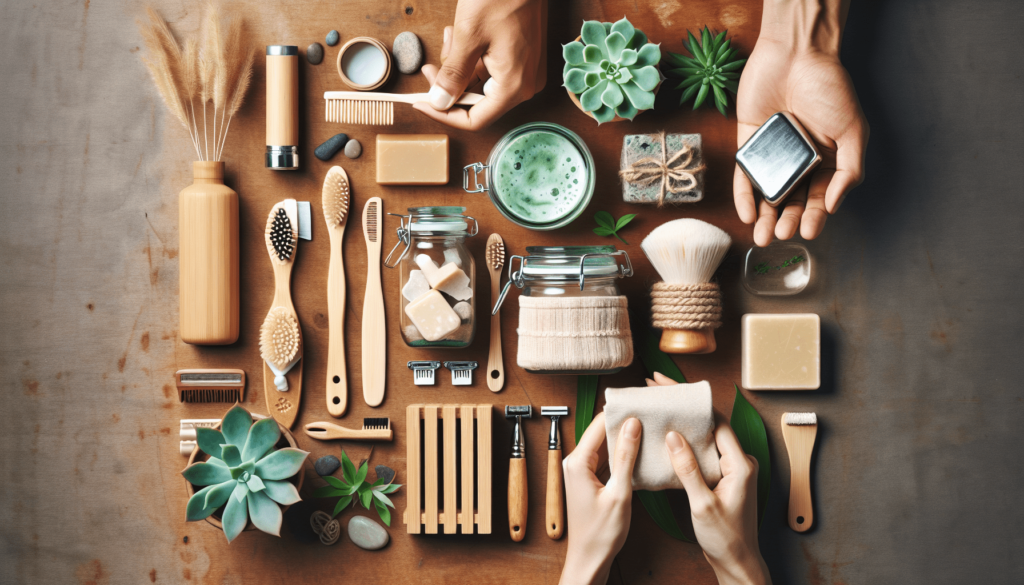
Reduce water waste in your routine
Shorter showers
One of the simplest ways to reduce water waste in your beauty routine is by taking shorter showers. The average shower can use a significant amount of water, especially if you’re taking long, leisurely showers. By making a conscious effort to conserve water and keep your showers shorter, you can minimize your water consumption and contribute to water conservation efforts. Try setting a timer or listening to your favorite songs to keep track of your shower time and make it a habit to keep your showers efficient.
Skip daily hair washing
Another way to minimize water waste in your routine is by skipping daily hair washing. Unless your hair gets excessively oily or dirty, it’s often unnecessary to wash your hair every day. By extending the time between washes, you can save both water and time. Instead of washing your hair daily, try using dry shampoo or simply rinsing with water on alternate days. This not only reduces water waste but can also benefit the health and appearance of your hair, as frequent washing can strip away natural oils.
Use a washcloth for facial cleansing
When cleansing your face, consider using a washcloth instead of constantly running water. Wet your washcloth, apply your cleanser, and gently cleanse your face without having the water continuously running. This method not only conserves water but also allows you to have better control over the cleansing process. Once you’re done, you can rinse the washcloth and hang it to dry, ready to be used again for your next cleansing session. By incorporating this simple change into your routine, you can save water without compromising on the effectiveness of your skincare routine.
Recycle and compost properly
Check local recycling guidelines
Proper recycling is essential for minimizing waste in your beauty routine. It’s important to familiarize yourself with your local recycling guidelines to ensure that you’re disposing of your empty product containers correctly. Different materials may require different recycling processes, so take the time to understand which items can be recycled and what should be disposed of separately. By following the proper recycling guidelines, you can ensure that your waste is being handled in the most sustainable way possible.
Reuse and repurpose containers
Instead of immediately discarding empty product containers, consider reusing or repurposing them. Glass jars, for example, can be cleaned and used to store homemade beauty products or other household items. Plastic containers can be repurposed for organizing small items, such as makeup brushes or cotton swabs. By giving these containers a second life, you reduce waste and make the most of the resources that went into producing them.
Compost organic beauty waste
Many beauty products contain organic materials that can be composted instead of thrown away. Items like coffee grounds, tea leaves, natural exfoliants, and plant-based ingredients can be composted in a home composting system or added to your local composting facility’s collection. By composting organic beauty waste, you not only divert waste from landfills but also contribute to the creation of nutrient-rich compost that can be used to nourish plants and gardens. Be sure to remove any non-compostable materials from the waste before composting.
In conclusion, transitioning to a zero-waste beauty routine involves making conscious choices and selecting products that prioritize sustainability. By switching to reusable products, opting for package-free or refillable options, choosing solid or concentrated products, and supporting zero-waste brands, you can significantly reduce the waste generated by your beauty routine. Additionally, by minimizing single-use plastic, choosing eco-friendly cleansers, reducing water waste, and properly recycling and composting, you can further enhance the sustainability of your routine. Making these changes not only benefits the environment but also allows you to prioritize your own well-being by using natural, eco-friendly products. So, start implementing these tips and recommendations today and start your journey towards a more sustainable and zero-waste beauty routine.
